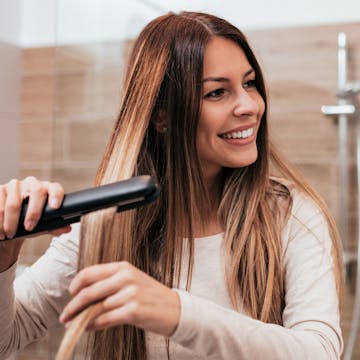Seasonal Hair Loss: What It Is & What To Do About It
Seasonal shedding? Don’t stress. Your hair goes through cycles, just like the seasons themselves.
If you’ve ever noticed more hair in your brush or on the shower floor during certain times of the year, you’re not alone. Seasonal hair loss is a real phenomenon, and while it might feel concerning, it’s often completely natural. The good news? There are several ways to support your strands and keep your hair looking and feeling healthy year-round.
In this blog, we’ll break down what causes seasonal hair shedding and share expert-backed tips on how to nourish your hair from the inside out, including the best foods, supplements, treatments, and scalp care habits for promoting growth and reducing hair fall.
What is seasonal hair loss?
Seasonal hair loss refers to an increase in hair shedding that occurs during certain times of the year, most commonly in the fall and sometimes in early spring. This temporary hair loss is typically due to changes in temperature, humidity, and daylight exposure, all of which can impact your hair’s natural growth cycle.
Hair grows in phases: the anagen (growth), catagen (transition), telogen (resting), and exogen (shedding) phases. During seasonal shifts, more hair enters the telogen phase, leading to noticeable shedding.
While it can be startling to see more hair fall than usual, seasonal hair loss is temporary and usually resolves on its own. That said, supporting your hair through this period can make a big difference in how it looks and feels.
Best Foods for Hair Health
What you eat plays a huge role in the health of your hair. A diet rich in vitamins, minerals, and protein can help strengthen strands and reduce breakage. Here are some top foods to incorporate into your meals to help keep seasonal hair loss at bay:
- Salmon: Packed with Omega-3 Fatty Acids and protein, salmon helps nourish hair follicles and support growth.
- Eggs: A great source of Biotin and Keratin-building protein, both essential for hair strength and thickness.
- Spinach: Loaded with Iron, Folate, and Vitamins A and C, which can help hydrate the scalp and support healthy sebum production.
- Nuts & Seeds: Almonds, walnuts, and flaxseeds are rich in Vitamin E, Zinc, and Fatty Acids that protect the hair shaft and encourage growth.
- Sweet Potatoes: High in Beta-carotene, which the body converts to Vitamin A—crucial for scalp health and hair cell turnover.
Best Supplements for Hair Health
Sometimes, it’s hard to get everything your hair needs from food alone. That’s where supplements can help fill the gap. Some of the most beneficial vitamins and minerals for hair include:
- Biotin (Vitamin B7): May help strengthen hair and promote growth.
- Vitamin D: Deficiency is linked to hair thinning; supplementation may help support follicle health.
- Iron: Crucial for oxygen transport to hair follicles—especially important for menstruating individuals.
- Zinc: Helps with tissue growth and repair, including hair follicles.
- Collagen: Provides amino acids your body uses to build keratin, the protein hair is made of.
Always consult your healthcare provider before adding new supplements to your routine, especially if you have underlying health conditions or are taking other medications.
Best Treatments for Hair Growth
When it comes to boosting hair growth and reducing seasonal shedding, the right treatments can make a noticeable impact:
- Bonding Treatments: Help fortify weakened strands and reduce breakage. eSalon’s Bond Repair Shampoo and Conditioner, for example, uses professional-grade technology to help rebuild and reinforce damaged hair to encourage longer, stronger strands.
- Scalp Serums: Target the root cause (literally!) by stimulating blood flow and nourishing the scalp with ingredients like Procapil™ and Redensyl™.
- Low-Level Laser Therapy (LLLT): A non-invasive treatment that uses red light to stimulate follicles and encourage growth.
- Minoxidil: An FDA-approved topical medication for hair regrowth (available over the counter) that increases blood flow to the scalp and reactivates follicles.
Scalp Care Tips for Healthy Hair
A healthy scalp is the foundation of healthy hair. Treating your scalp like skin (because it is!) can help minimize seasonal shedding and promote growth. Here’s how to care for it properly:
- Exfoliate Weekly: Use a scalp scrub or exfoliating brush to remove product buildup and dead skin.
- Keep It Clean, But Not Stripped: Use a gentle, sulfate-free shampoo like eSalon’s Classic Shampoo to cleanse without over-drying.
- Hydrate: A dry scalp can lead to inflammation and flaking. Look for treatments with ingredients like aloe vera or hyaluronic acid.
- Massage Regularly: Daily scalp massages increase circulation, which can help stimulate hair growth.
- Protect From the Elements: Harsh sun, wind, and cold can stress your scalp. Wearing hats or using UV-protectant sprays can help shield it from damage.
Seasonal hair loss is natural, but that doesn’t mean you have to sit back and let your strands suffer. By eating the right foods, incorporating targeted supplements, trying effective treatments, and nurturing your scalp, you can give your hair the support it needs to stay strong and vibrant—no matter the season.
Looking for personalized solutions to boost hair health? Explore eSalon’s custom hair care and hair growth routines formulas, made just for you by hair care experts using professional-grade ingredients.





